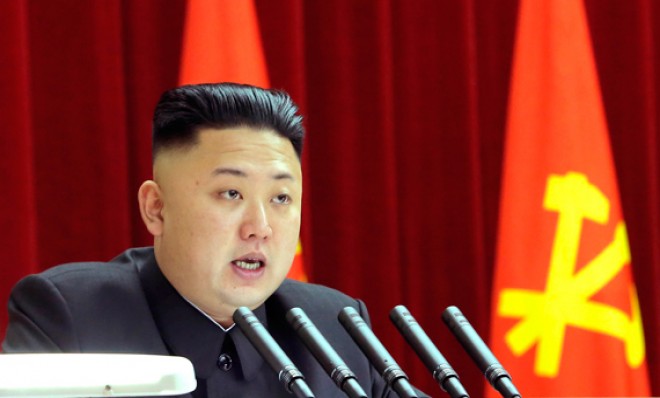How the U.S. should handle North Korea's threats
Pyongyang declares a "state of war," and the U.S. beefs up missile defenses. Is that the wisest response?


A free daily email with the biggest news stories of the day – and the best features from TheWeek.com
You are now subscribed
Your newsletter sign-up was successful
North Korean leaders took their belligerent rhetoric to a new level over the weekend, declaring a "state of war" with South Korea and calling the U.S. mainland a "boiled pumpkin" vulnerable to attack. North Korea, under its untested young leader Kim Jong Un, has stepped up its threats in recent weeks in the face of increased sanctions for its recent nuclear and missile tests. The communist regime's leaders said on Sunday that they would never negotiate away their nuclear program, calling it "the nation's life." With tensions rising, the U.S. is sending stealth fighter jets to South Korea for joint military exercises meant to be a show of strength by the two allies, both of which are in Pyongyang's crosshairs.
The Hermit Kingdom is infamous for making outrageous threats, but some analysts say this time the U.S. really needs to prepare for the possibility of war. The Obama administration has already flown stealth war planes to South Korea, beefed up its missile defenses on America's Pacific Coast, and conducted drills with South Korea, where 30,000 U.S. military personnel are stationed. We need to do more, Ed Gillespie, former senior adviser to the 2012 GOP presidential nominee, Mitt Romney, tells CNN.
It would be good for the administration to not only bolster our own missile defense, but to support Japan and South Korea with missile defense. They are nervous, understandably, and I think doing anything — everything we can to reassure them would be helpful. [CNN]
With Pyongyang threatening war, the U.S. and its close ally, South Korea, have little choice but to prepare to defend against a North Korean attack, Korea expert Scott A. Snyder tells the Council on Foreign Relations. They should also agree on a diplomatic strategy for whenever Pyongyang decides it's ready to start a dialogue again.
The Week
Escape your echo chamber. Get the facts behind the news, plus analysis from multiple perspectives.

Sign up for The Week's Free Newsletters
From our morning news briefing to a weekly Good News Newsletter, get the best of The Week delivered directly to your inbox.
From our morning news briefing to a weekly Good News Newsletter, get the best of The Week delivered directly to your inbox.
Given that South Korea faces the greatest risk from North Korean provocations, U.S. policy coordination with South Korea is an essential first step in fashioning an effective approach to North Korea.... South Korea would have to accept either direct U.S. diplomacy or military intervention with North Korea before either option would be implemented. Both the U.S. and South Korean governments must agree on a common strategy, and they have historically been wary of North Korean efforts to divide the alliance. [Council on Foreign Relations]
The most important thing, however, is to avoid doing anything that makes matters worse. Since taking over after the death of his father, Kim Jong Un has proven himself to be a "master of panic promotion," says Rajan Menon at the Atlantic Council. But his country's "melodrama is calculated, not crazy." He, like his dad, knows that the U.S. and South Korea could wipe his country off the map. He also knows that his "apocalyptic outbursts" will cause the U.S. and its partners to "react in a semipanic," then "when the dust settles and diplomacy begins" they'll offer carrots out of fear North Korea will one day really and truly go ballistic. If the U.S. wants to get the better of him, "'No Drama' Obama should live up to the label."
A war there would be calamity. But that's the point. Rising to Pyongyang's bait simply aggravates the periodic crises. That in turn increases the odds that one party might do something rash — accidentally, or deliberately, to show its mettle — that then spirals into a war that nobody wanted. So when Beijing tells Washington that the American decision to bolster missile defenses will merely add to the tension, it has a point.
The best reaction to Kim is no reaction. Continuing the old tit-for-tat pattern simply perpetuates it. Note to Seoul and Washington: Don't just do something, stand there. [Atlantic Council]
A free daily email with the biggest news stories of the day – and the best features from TheWeek.com
Harold Maass is a contributing editor at The Week. He has been writing for The Week since the 2001 debut of the U.S. print edition and served as editor of TheWeek.com when it launched in 2008. Harold started his career as a newspaper reporter in South Florida and Haiti. He has previously worked for a variety of news outlets, including The Miami Herald, ABC News and Fox News, and for several years wrote a daily roundup of financial news for The Week and Yahoo Finance.
-
 The ‘ravenous’ demand for Cornish minerals
The ‘ravenous’ demand for Cornish mineralsUnder the Radar Growing need for critical minerals to power tech has intensified ‘appetite’ for lithium, which could be a ‘huge boon’ for local economy
-
 Why are election experts taking Trump’s midterm threats seriously?
Why are election experts taking Trump’s midterm threats seriously?IN THE SPOTLIGHT As the president muses about polling place deployments and a centralized electoral system aimed at one-party control, lawmakers are taking this administration at its word
-
 ‘Restaurateurs have become millionaires’
‘Restaurateurs have become millionaires’Instant Opinion Opinion, comment and editorials of the day
